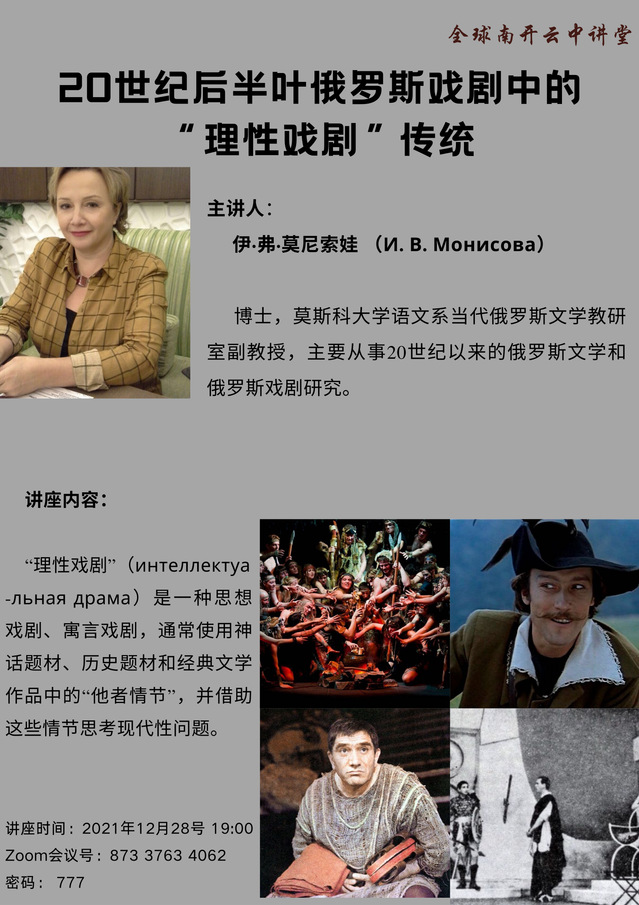
On December 28th, with the invitation of the College of Foreign Languages of Nankai University, И. В. Монисова, a professor of Moscow State University, gave an online lecture entitled “Rationality in Russian Drama in the Second Half of the 20th Century” for teachers and students from Nankai University and many researchers of drama. This is also the last Russian lecture of the series of “Global Nankai Lecture Hall on Air” of this semester, which has attracted wide attention from teachers and students. Wang Lidan, professor of the Russian Department of the College of Foreign Languages, presided over the lecture.
И. В. Монисова works in the Teaching and Research Office of Contemporary Russian Literature of the Language Department of Moscow State University, and mainly engages in the research of Russian literature and Russian drama since the 20th century. In the lecture, Монисова introduced the concept of “rational drama”. Originated in Europe, this concept differs from traditional drama with emotion as the core in its creative ideas—the first rule of “rational drama” is rational thinking. The emergence of “rational drama” conforms to the main purpose of the development of European drama in the 20th century, that is, to awaken rationality, urge the audience to think, break “the fourth wall” and let the audience participate in the joint creation. Монисова probed into the tradition of “rational drama” from narrow sense and broad sense. She said that “rational drama” in a broad sense was a rational trend in the development of drama, which originated from the “debate drama” proposed by the Irish playwright Bernard Shaw, where the whole play focused on a core issue. German playwright Brecht’s narrative drama and many of Russian playwright Yepleynov’s dramaturgical theories have laid the foundation for the development of rational trend in drama. In a narrow sense, “rational drama” refers to the creation of drama with rational philosophy as the core and classical texts such as fables, myths and historical legends as the plot. It is not only the continuation of hypothetical drama, but also the object for key analysis in this lecture.
Монисова made an in-depth interpretation of the representative works of European “rational drama” in the 20th century, including Sartre’s The Fly and Girodu’s The Trojan War Will Not Take Place. She held that the protagonists of “rational drama” in the 20th century often faced the choices between the individual and the country, life and death, good and evil, often in the form of fables with plots developing from both the light and the dark sides. The well-known classic texts were endowed with profound modern philosophy in the “rational drama” of the 20th century. Influenced by European culture, a large number of “rational dramas” were born in Russia in the 20th century. Монисова introduced the classic works of representative writers, including Mikhail Roshchin’s The Seventh feat of Hercules, Volodin’s Two Arrows, Grigoriy Gorin’s The Very Same Munchausen and Edvard Stanislavovich Radzinsky’s Conversations with Socrates. She emphasized that the language of “rational drama” is often paradoxical and ironic, and the time, space and plot show hypothetical characteristics, so as to allude to the problems of real life.
Монисова also interpreted in simple terms the development of “rational drama” in Europe and Russia in the 20th century. Teachers and students seemed to be brought into the charming world of drama, and felt the power of promoting people’s thinking and educate people’s hearts through “rational drama”.
At the end of the lecture, Монисова communicated and interacted with teachers and students online.



